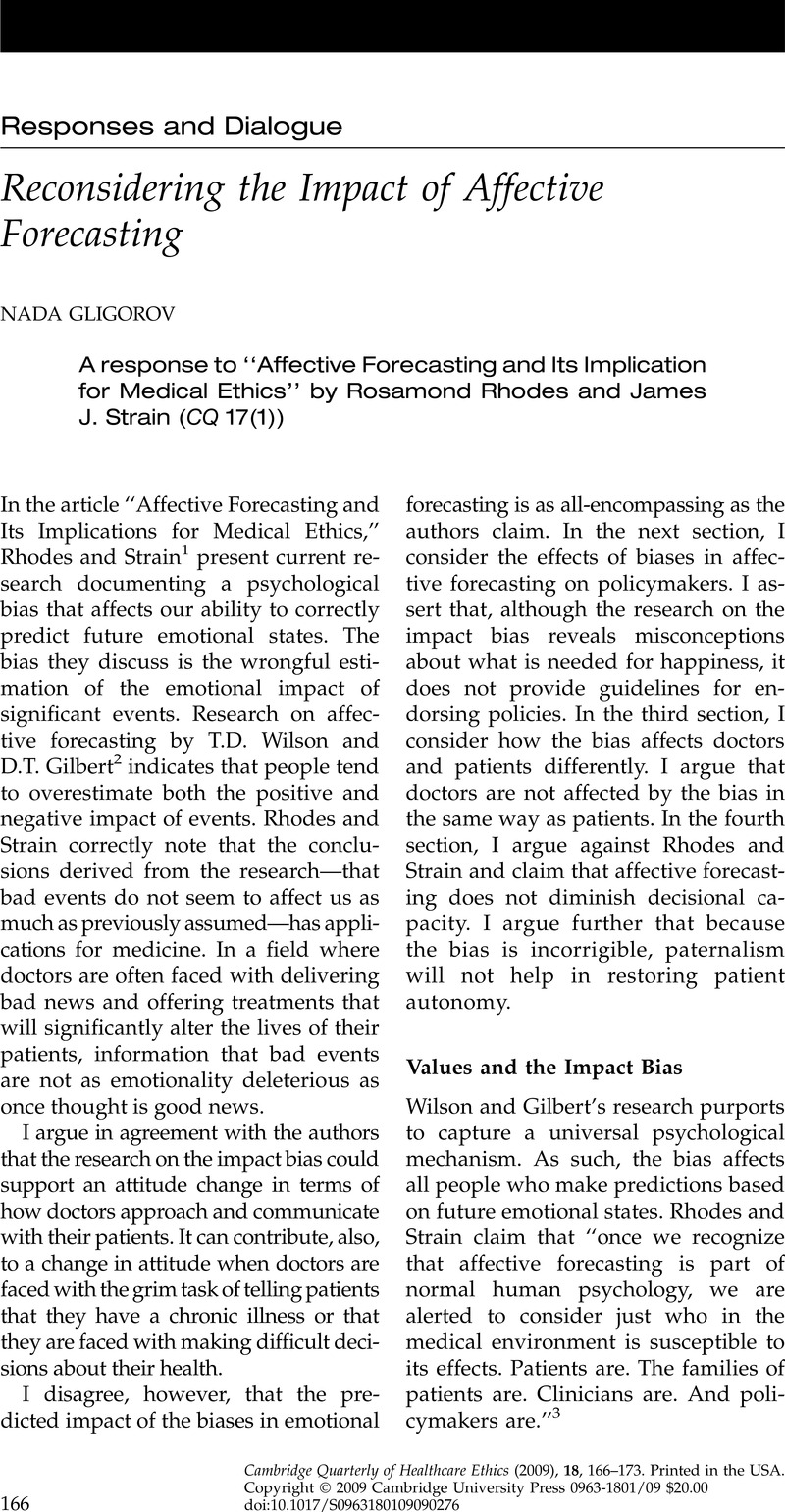Published online by Cambridge University Press: 01 April 2009

1. Rhodes R, Strain JJ. Affective forecasting and its implications for medical ethics. Cambridge Quarterly of Healthcare Ethics 2008;17:56–67.
2. Gilbert DT, Pinel EC, Wilson TD, Blumberg SJ, Wheatley TP. Immune neglect: A source of durability bias in affective forecasting. Journal of Personality and Social Psychology 1998;75(3):617–38; Gilbert DT, Driver-Linn E, Wilson TD. The trouble with Vronsky: Impact bias in the forecasting of future affective states. In: Barrett LF, Salovey P, eds. The Wisdom in Feeling: Psychological Processes in Emotional Intelligence. New York: Guilford; 2002:114–43; Wilson TD, Gilbert DT. Affective forecasting. Advances in Experimental Social Psychology 2003;35:345–411.
3. See note 1, Rhodes, Strain 2008:57.
4. It should be noted that the studies indicate, in some instances, that there is a difference in happiness between people who have had a positive event as opposed to others who did not. Gilbert et al. (1998) compared the levels of happiness for both “lovers” (people currently in romantic relationships) and “loners” (people not currently involved in romantic relationships). The results of the research was summarized: “In short, lovers were happier than loners, loners expected that becoming involved in a close romantic relationship would increase their happiness, and loners correctly predicted that if they were to become lovers, they would be just about as happy as old and young lovers actually turned out to be” (see note 2, Gilbert et al. 1998:621). The results seem to indicate that positive events actually do contribute to levels of happiness. Conclusions drawn from the research should not be that the valence of the event does not impact happiness level, rather that our predictions about how strongly we will feel are not always correct. Bad news can have a negative affect. One is happier if healthy than sick, but getting sick is not as bad as predicted.
5. Christianson SA, Safer MA. Emotional events and emotion in autobiographical memory. In: Rubin D, ed. Remembering Our Past: Studies in Autobiographical Memory. Cambridge, UK: Cambridge University Press; 1996:218–43 at p. 235.
6. See note 2, Gilbert et al. 1998.
7. See note 2, Gilbert et al. 1998:637.
8. A further obstacle to transferring benefits from past emotional recovery is that the “psychological immune system” is an unconscious process. People rationalize an event in order to cope with it, but the mechanism only works if the person is not aware of it. One could see a parallel in the “sour grapes” phenomenon. If one does not get a desired outcome, one deals with it by attempting to diminish the desirability of that goal. Drawing attention to that process by alerting the person that he or she has a case of the “sour grapes,” will diminish the effectiveness of the coping mechanism.
9. See note 1, Rhodes, Strain 2008:58.
10. Gert B, Culver C, Clouser KD. Bioethics: A Return to Fundamentals. New York: Oxford University Press; 1997.
11. See note 1, Rhodes, Strain 2008:61.
12. See note 1, Rhodes, Strain 2008:61.
13. Dworkin G. Paternalism. The Monist 1972;56:64–84.